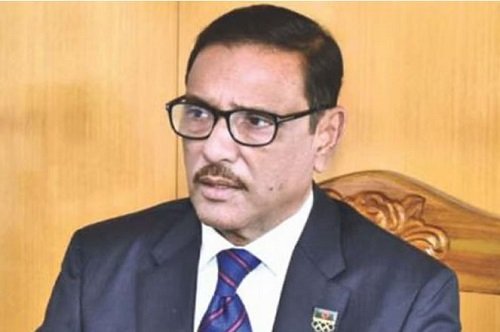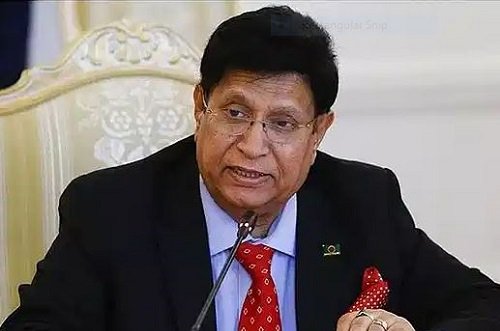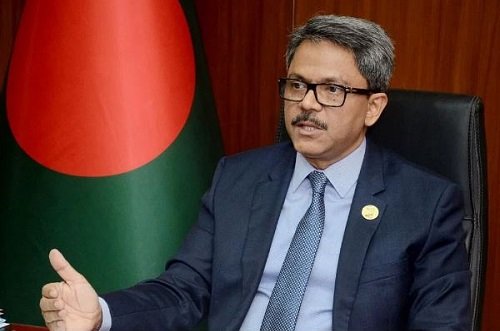The government of Bangladesh has taken strong stance against foreign intervention in the country’s national politics, emphasizing the importance of preserving its sovereignty, democracy and independence.
Bangladesh has made significant progress in a number of areas, including economic growth, social development, terrorism control, and political stability. The government is persistent that the country’s internal affairs should be determined solely by its citizens and their elected representatives, without interference from outside parties. While the government welcomes constructive engagement and collaboration with the international community, it remains determined in defending its independence and rejecting any undue influence or interference.
Thus, the Bangladesh government has been criticizing and resisting foreign interventions in the country’s internal affairs such as- election, criticizing and putting sanctions over Bangladesh’s elite forces, questioning the country’s human rights record etc.
PM Sheikh Hasina’s strong rebuke
During Prime Minister Hasina’s visit to London, she sat down with BBC Anchor Yalda Hakim for an interview (broadcasted on Tuesday, May 16) in which she discussed US sanctions against the Rapid Action Battalion (RAB) and other issues.
In the interview, BBC’s Hakim questioned the prime minister about Bangladesh’s human rights record and concerns regarding extrajudicial murders, enforced disappearances, torture, and media repression. PM Hasina denied the allegations, claiming there was no evidence to support them. “Some groups mentioned a large number [of enforced disappearances] but when we enquired it was perhaps five or six persons. Actually, some people hide because of different issues.”
When asked why the United States imposed sanctions on one of the paramilitary organizations in Bangladesh, the prime minister responded,
“I don’t know, maybe they don’t want me to continue – or, the progress we are making for Bangladesh, they may not accept it. This is my feeling.”
The prime minister announced on May 13 that Bangladesh will not purchase anything from nations that impose sanctions against it. “There is now a tendency to give sanctions, and sanctions on those by whom we contain terrorism. We have taken a decision. I have said that I will not buy anything from those who will give sanctions,” she said.
Obaidul Quader counts on people not foreigners
In regarding national election, Awami League General Secretary and Road Transport and Bridges Minister Obaidul Quader on Tuesday said not the foreigners but the people would decide which party would come to power. “Not the foreigners but the mass people would decide who will rule the country as we believe in people’s power”, he said.

Awami League General Secretary and Road Transport and Bridges Minister
In addition, in response to a question about Mirza Fakhrul’s claim that the government is agitated on Western countries out of fear of losing power, the Road Transport Minister stated, “BNP leader Mirza Fakhrul have a belief that the Western countries would help him and his party BNP to come to the power.”
The ruling party stated that the Awami League would never consider such an impossibility, stating that the true owners of the country are the people and not foreigners, thereby refuting the notion that a foreign power would aid in gaining power.
Foreign Ministry’s tactic
About the US concern regarding democracy in Bangladesh, Foreign Minister AK Abdul Momen, a month ago remarked: “We fought for democracy. Three million people gave their lives to uphold democracy and human rights. So, we do not need lessons on democracy.”
“We want a fair election. America also wants a fair election; we do not disagree with that. We have already made necessary institutional arrangements to ensure a free and fair election,” he said.

Minister of Foreign Affairs Bangladesh
Earlier, in last year’s December, Abdul Momen had said, “No internal forces will be allowed to conspire while no foreigners will be allowed to interfere in the process of next general election. The government is pledge-bound to protect the rights of vote, human rights, justice and freedom of expression.” “We are also pledge-bound to protect the rights of voting,” the minister added.
Additionally, on 11 December, 2022, state minister for foreign affairs Md. Shahriar Alam said, “The government will not bow down to any foreign pressure. People of this country are the source of power of the government of Bangladesh. It is the people who will decide who will rule them”.

State Minister of Ministry of foreign affairs of Bangladesh
What can be the cause?
Allegedly due to its rational economic and developmental partnership with China and Russia, the United States has long been apprehensive about the present government in Bangladesh. Bangladesh-China relations are historically, economically, and sustainably grounded. In recent years, Bangladesh has purchased a substantial quantity of military equipment from China, including corvettes, naval guns, anti-ship missiles, and surface-to-air systems.
Likewise, Bangladesh has maintained positive relations with Russia since its founding. The prime minister stated last year that Russia is an ally of Bangladesh, and that it stood by the nation when the US 7th fleet was dispatched to the Bay of Bengal during the 1971 Liberation War. Therefore, Bangladesh did not vote against Russia at the United Nations, as the resolution was directed against a particular nation.
Many cite the opposition party’s role in influencing western powers to oppose the government. Allegedly, they carry out frequent lobbying with their foreign allies by filing complaints and employing lobbyists. Whether the United States is interfering for its own reasons or due to opposition, no country should interfere in the internal affairs of another nation.
Very few nations have the boldness and courage to condemn international interference in national affairs like Bangladesh govt. has shown. Bangladesh government’s fearless resistance against foreign intervention in national politics underscores its commitment to safeguarding the nation’s sovereignty, autonomy, and democratic principles.


